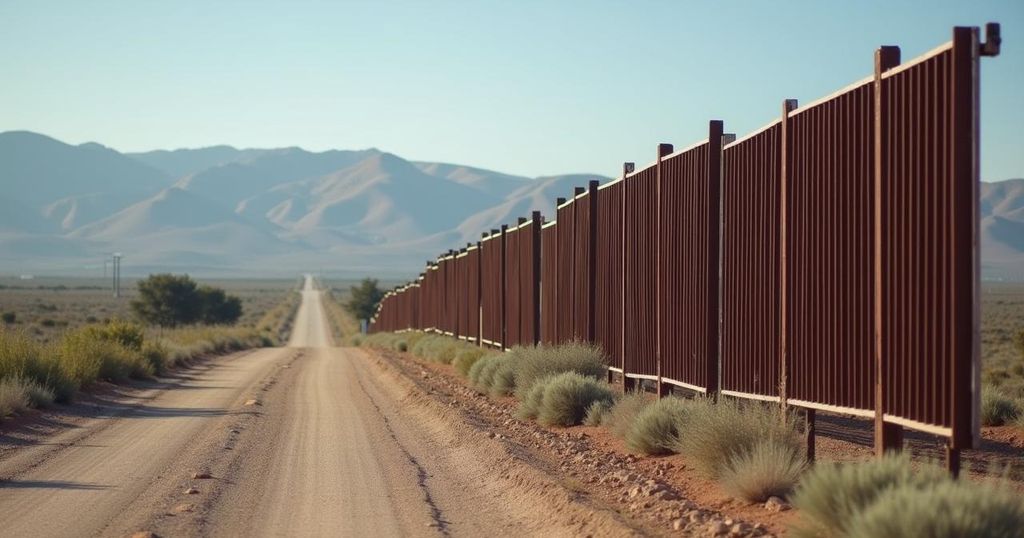Mexico Enhances Border Enforcement Amid U.S. Election Dynamics

As the U.S. election approaches, Mexico is intensifying its border enforcement efforts, significantly reducing the number of migrants reaching the U.S. border from nearly 250,000 in December to below 60,000 in recent months. This decrease is attributed to an unwritten agreement between the Biden administration and Mexico, strategically linked to political interests and the economic repercussions of migration policy, highlighting complex humanitarian and ethical concerns as the elections draw near.
As the United States approaches its election season, Mexico is intensifying its enforcement of border control measures to limit the flow of migrants attempting to reach the U.S. border. Analysts attribute this reduction in migrant encounters to a tacit agreement between the Biden-Harris administration and the Mexican government, which serves Mexico’s economic interests and reflects the political climate leading up to the U.S. presidential election. Current statistics indicate a significant decrease in illegal border crossings, with the number of migrant encounters dropping from approximately 250,000 in December to under 60,000 in recent months, marking the lowest totals since the Trump administration. This proactive approach from Mexico is critical, particularly as migrant issues have often been used as a focal point in Republican campaigns and remain a vulnerable area for Democratic candidates, including Vice President Kamala Harris. President Claudia Sheinbaum, newly elected in Mexico, is acutely aware of the implications that migration policy may have on American electoral outcomes. Experts believe that while Mexico has not explicitly committed to influencing the U.S. vote, there is a collective understanding of the stakes involved. The Biden administration’s negotiations with Mexico last December emphasized the urgency of addressing the migration surge that had overwhelmed American cities, alongside threatening potential political repercussions for Democrats amid heightened scrutiny over border security. The enforcement measures undertaken by Mexico include increased deportation efforts and stricter asylum policies, as well as the systematic detention and transportation of migrants back to southern Mexico, often eroding their hopes of reaching the United States. This has resulted in severe humanitarian conditions for many migrants, who find themselves stranded in urban centers, living in precarious circumstances, and facing continual deportation and re-encounter with Mexican authorities. As the election looms, the responsibility for managing migration has transformed into a political tool for the Mexican government, impacting both domestic policies and the bilateral relationship with the United States. This situation raises critical ethical and humanitarian concerns regarding the treatment of migrants, many of whom are fleeing violence and instability in their home countries.
In recent months, the dynamics surrounding U.S.-Mexico migration have shifted markedly due to the impending U.S. elections. The Biden administration has been pressured to address record levels of migration, which have historically influenced electoral outcomes. Therefore, a strategic alliance with Mexico has emerged as an essential component of U.S. immigration policy. This collaboration centers around controlling the migration flow, ensuring border stability, and mitigating the political fallout that may arise from failure to manage such challenges. This context informs the motivations behind Mexico’s rigorous enforcement actions, which, while economically and politically beneficial for Mexico, present significant human rights challenges for migrants displaced by dire circumstances.
In conclusion, Mexico’s enhanced border enforcement reflects a calculated response to the intersection of economic interests and political pressures surrounding the U.S. election. The outcome of this collaboration has led to a dramatic decrease in migrant encounters at the U.S.-Mexico border, but raises profound ethical questions regarding the treatment of migrants. The evolving policies highlight the complex nature of migration, where humanitarian considerations often clash with political objectives. As the elections draw nearer, the commitment from Mexico to maintain these enforcement measures remains pivotal, with broad implications for both nations and those seeking refuge.
Original Source: www.usatoday.com







